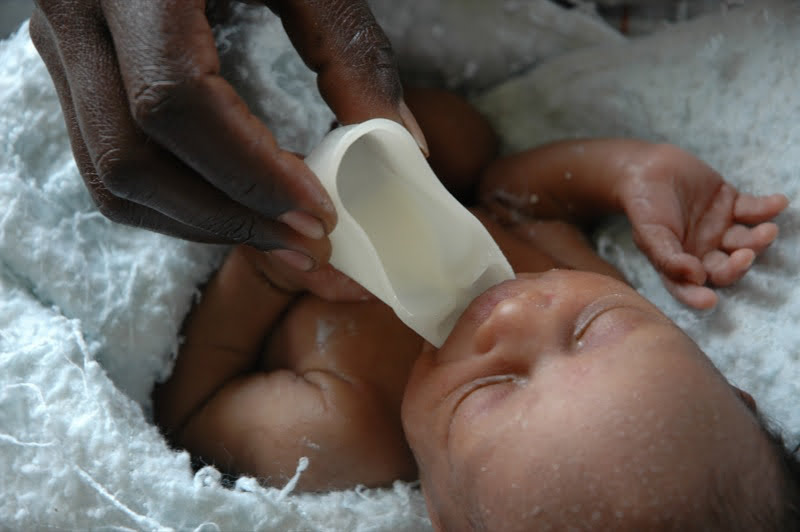This article for midwives was first published in The Practising Midwife, our partner journal for Evidence for Everyday Midwifery. It has been written in two parts; Sarah Chapman (Cochrane UK) first summarizes the review and then Alys Einion (Associate Professor of Midwifery at Swansea University) reflects on the evidence and its implications for practice.
Page last checked 4 April 2023
The current international recommendation by the World Health Organization (WHO) is that healthy infants should be exclusively breastfed, where possible, for the first six months of life. In practice, many breastfed infants are given other fluids and/or food before that age, but is there good evidence to show whether there are benefits to this, or whether it could be harmful?
The review

A Cochrane Review Early additional food and fluids for healthy breastfed full‐term infants (August 2016) exploring the benefits and harms of giving full-term healthy breastfeeding infants additional food or fluid has now been updated with the inclusion of two new studies and one that was previously reported as ongoing. It now includes 11 randomisedRandomization is the process of randomly dividing into groups the people taking part in a trial. One group (the intervention group) will be given the intervention being tested (for example a drug, surgery, or exercise) and compared with a group which does not receive the intervention (the control group). studies from a wide range of countries, involving 2,542 infants and mothers (nine studies with 2,226 participants providing relevant dataData is the information collected through research.). Meta-analysisThe use of statistical techniques in a systematic review to combine the results of included studies. Sometimes misused as a synonym for systematic reviews, where the review includes a meta-analysis. was only possible for the primary outcome of breastfeeding duration and one secondary outcome: weight change.
What they found
The bottom line is that the review authors “found no evidence to disagree with the current international recommendation that healthy infants exclusively breastfeed for the first six months”.
They found that giving infants small amounts of artificial milk made no difference to breastfeeding rates at hospital discharge, but that it may have slightly increased the likelihood of any breastfeeding at three months. Those exclusively breastfed were more likely to continue to breastfeed than those given additional water or glucose water in the first days of life and these additional fluids were not shown to bring any benefits in terms of glucose levels, temperature or weight loss.
The use of artificial milk before breastfeeding may have had a slight protective effect against allergy symptoms at 18 months, but these studies did not carry out tests to verify reported allergy symptoms and this finding needs to be interpreted cautiously. Exclusively breastfed infants and those given extra foods at four to six months showed no differences in weight gain or iron deficiency, nor riskA way of expressing the chance of an event taking place, expressed as the number of events divided by the total number of observations or people. It can be stated as ‘the chance of falling were one in four’ (1/4 = 25%). This measure is good no matter the incidence of events i.e. common or infrequent. of food protein-induced enterocolitis syndrome reactions, ‘food allergy’, eczema, and symptoms such as coughs and runny noses.
Quality of the evidence
None of these studies provides high quality evidence. For the comparison of early additional foods versus exclusive breastfeeding, the evidence was moderate quality for weight change, expressed as a z-score at four-six months, food allergy at one-three years, visible eczema at 12 months and food protein enterocolitis syndrome. For the remaining outcomesOutcomes are measures of health (for example quality of life, pain, blood sugar levels) that can be used to assess the effectiveness and safety of a treatment or other intervention (for example a drug, surgery, or exercise). In research, the outcomes considered most important are ‘primary outcomes’ and those considered less important are ‘secondary outcomes’. and comparisons the evidence was low or very low quality, including the two studies with data on early additional milks versus exclusive breastfeeding that is potentially in disagreement with the WHO recommendation.
What next?
The review authors note that supplementing breastfeeding may have effects on aspects of maternal health not explored in these studies, such as engorgement, mastitis and earlier return to fertility. Nor have long-term effects been studied here. Other research has indicated possible harms of early supplementary feeding, and they suggest that randomising infants to receive it solely for research purposes “may now be considered unethical”.

Reflections on the review, by Alys Einion
The review by Smith and Becker (2016) set out to evaluate whether the introduction of additional fluids and foods would positively or negatively affect outcomes for babies who are healthy and were born at full term. The authors also set out to identify what effect (if any) the introduction of supplements such as artificial milk, water or other foods or fluids might have on infant health, wellbeing and feeding. This fundamental and challenging area of midwifery practice needs constant interrogation in order to ensure midwives are able to access the best evidence available to support their work in promoting maternal and child health. As such, the report adds to the evidence midwives can use to support women to make informed choices.
Smith and Becker clearly define the scope of their review, and provide a detailed exploration of the background and context, which makes for interesting reading and also provides a highly useful summary of the current debates. Midwives can gain from reading this report as it does provide a succinct overview, and explores the context and importance of the review itself. Reference is made to the weight of evidence showing the benefits of exclusive breastfeeding for infant and for mother, and the potential implications of the introduction of other foods or fluids are explored in detail.
Implications for practice
Potential misinterpretation
This review reinforces the advice that midwives give regarding breastfeeding, and seems to demonstrate that promoting exclusive breastfeeding for the first six months of life can still be argued to be best practice. However, there are issues raised within this review, one of which is the reporting of research that shows that the introduction of artificial milk before breastfeeding might protect against allergy symptoms at age 18 months. Despite being followed by a critical view of the limitations of this research, and rightly so – limitations that could be argued to be sufficient to make this finding inapplicable to midwifery practice – such an assertion could be wrongly interpreted by mothers and perhaps even by clinical staff as supporting there being no harm in the introduction of artificial milk in babies whose mothers intend to breastfeed.
The review also explores the introduction of water or glucose water and found no benefit to this practice in terms of continuation of breastfeeding, glucose levels, temperature, or weight loss due to breastfeeding. This is an important finding for midwifery practice, particularly in the UK where there appears to be, in some maternity units, a very low tolerance for lower blood sugar in infants and a quick recourse to the use of supplementation.
Public health issue
The evidence base for promoting exclusive breastfeeding is significant. Breastfeeding is seen as a major public health issue (WHO 2011), one which continues to consume policy makers and clinical staff but which must be considered in the light of multiple social, economic and personal factors (de Jager et al 2013). For example, it is known that the age of the mother, her socio-economic status, her marital status, where she lives and her educational level all affect whether mothers decide to breastfeed and whether they continue to breastfeed over time (de Jager et al 2013). The decline in exclusive breastfeeding found globally seems to show that more work needs to be done to promote breastfeeding as the optimal form of infant nutrition. An interesting finding by O’Brien et al (2008) shows that psychosocial factors affect whether someone will exclusively breastfeeding more than other demographic factors.
How does this link to this paper? Smith and Becker (2016) have found nothing to suggest that the current opinion on best practice – that of promoting exclusive breastfeeding until the child is six months old – is not the best way forward. However, given that breastfeeding rates at six months remain so low, it is important to consider how to use this information to support women. The authors suggest that women and professionals should be aware of the potential risks associated with the introduction of other food and fluids for breastfeeding babies, and that women need skilled support to establish and maintain breastfeeding. The wider evidence base would suggest that this support needs to incorporate a knowledge of psychosocial factors which could affect infant feeding choices.
Targeted interventions
It could also be argued that there may be need for targeted interventions to improve the care provided to women, particularly in addressing attitudes and behaviours of hospital staff (Smith and Becker 2016). Many midwives will recognise the issue of hospital culture as a challenge to promoting breastfeeding, and this review highlights the need to ensure that additional supplements are only given when clinically indicated. The parameters of this clinical indication, however, may vary from health care provider to health care provider, and this, therefore, is an issue that needs further exploration. Wight et al (2014) argue strongly that any clinical management of hypoglycaemia should be based on sound and reliable clinical indicators, and should not interfere with breastfeeding. This suggests an individualised approach to assessing neonatal blood glucose as part of an overall symptom picture (Wight et al 2014), rather than applying a one-size-fits-all approach based on protocols. However, the report by Smith and Becker (2016) also shows that the introduction of some artificial supplementation in the early days does not necessarily have a negative effect on breastfeeding. This is reassuring for women whose babies have needed supplementation.
References can be found here. Featured image by Kevin Burgert under creative commons licence (no adaptation made).


